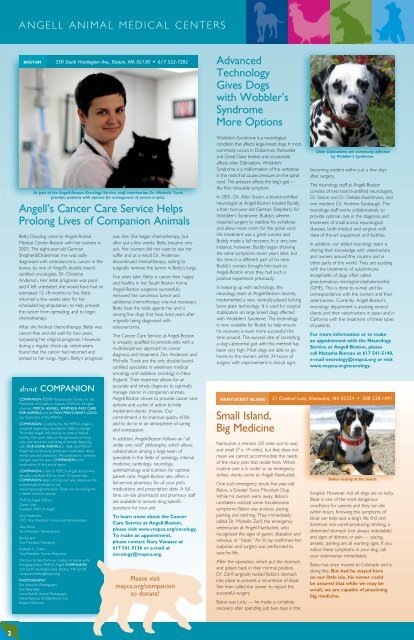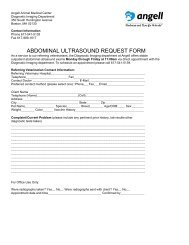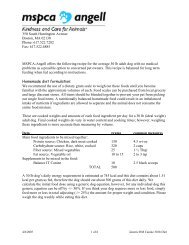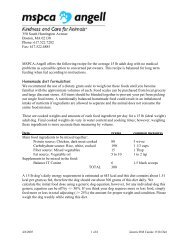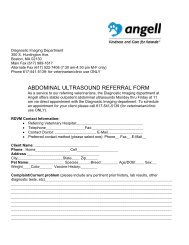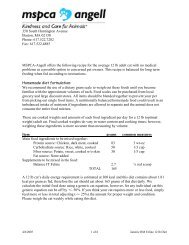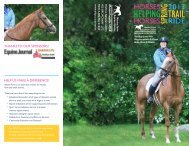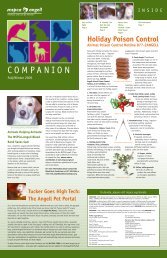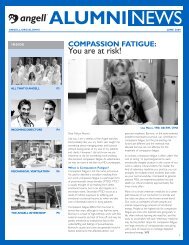COMPANION
COMPANION - mspca
COMPANION - mspca
- No tags were found...
You also want an ePaper? Increase the reach of your titles
YUMPU automatically turns print PDFs into web optimized ePapers that Google loves.
A N G E L L A N I M A L M E D I C A L C E N T E R S<br />
BOSTON 350 South Huntington Ave., Boston, MA 02130 617 522-7282<br />
As part of the Angell-Boston Oncology Service, staff veterinarian Dr. Michelle Turek<br />
provides patients with options for managment of cancer in pets.<br />
Angell’s Cancer Care Service Helps<br />
Prolong Lives of Companion Animals<br />
Betty Dowling came to Angell Animal<br />
Medical Center-Boston with her owners in<br />
2003. The eight-year-old German<br />
Shepherd/Doberman mix was sadly<br />
diagnosed with osteosarcoma, cancer in the<br />
bones, by one of Angell’s double boardcertified<br />
oncologists, Dr. Christine<br />
Anderson. Her initial prognosis was poor,<br />
and if left untreated, she would have had an<br />
estimated 12-18 months to live. Betty<br />
returned a few weeks later for her<br />
scheduled leg amputation, to help prevent<br />
the cancer from spreading, and to begin<br />
chemotherapy.<br />
After she finished chemotherapy, Betty was<br />
cancer-free and did well for two years,<br />
surpassing her original prognosis. However,<br />
during a regular check-up, veterinarians<br />
found that the cancer had returned and<br />
spread to her lungs. Again, Betty’s prognosis<br />
about <strong>COMPANION</strong><br />
<strong>COMPANION</strong> ©2008 Massachusetts Society for the<br />
Prevention of Cruelty to Animals (MSPCA). All rights<br />
reserved. MSPCA, ANGELL, KINDNESS AND CARE<br />
FOR ANIMALS and the PAW PRINT-HEART LOGO<br />
are trademarks of the MSPCA.<br />
<strong>COMPANION</strong> is published by the MSPCA-Angell, a<br />
nonprofit organization founded in 1868 by George<br />
Thorndike Angell. We receive no state or federal<br />
funding. Our work relies on the generosity of those<br />
who care about the well-being of animals. Beginning<br />
with OUR DUMB ANIMALS in 1868, the MSPCA-<br />
Angell has continuously produced a publication about<br />
animal care and protection. The publication’s name has<br />
changed over the years. <strong>COMPANION</strong> is the<br />
continuation of that proud legacy.<br />
<strong>COMPANION</strong> is sent to MSPCA-Angell donors who<br />
annually contribute $15 or more. To ensure that<br />
<strong>COMPANION</strong> keeps coming your way, please use the<br />
enclosed gift envelope or visit<br />
www.mspca.org/companion. Thank you for making this<br />
a better world for animals.<br />
MSPCA-Angell Officers:<br />
Carter Luke<br />
President, MSPCA-Angell<br />
Amy Fredericks<br />
CFO, Vice President, Finance and Administration<br />
Alice Bruce<br />
Vice President, Development<br />
Bonnie Jarm<br />
Vice President, Marketing<br />
Kathleen K. Collins<br />
Vice President, Human Resources<br />
We love to hear from our readers so please write:<br />
Managing Editor, MSPCA-Angell <strong>COMPANION</strong><br />
350 South Huntington Ave., Boston, MA 02130<br />
companioneditor@mspca.org<br />
PHOTOGRAPHY<br />
Eric Antoniou Photography<br />
John Beardsley<br />
Lance Bukoff, Accent Photography<br />
Diane Delucca of Little Brown Cat<br />
Kristen McKinnon<br />
was dire. She began chemotherapy, but<br />
after just a few weeks, Betty became very<br />
sick. Her owners did not want to see her<br />
suffer and as a result Dr. Anderson<br />
discontinued chemotherapy, opting to<br />
surgically remove the tumor in Betty’s lungs.<br />
Five years later, Betty is cancer-free, happy<br />
and healthy in her South Boston home.<br />
Angell-Boston surgeons successfully<br />
removed the cancerous tumor and<br />
additional chemotherapy was not necessary.<br />
Betty beat the odds against her and is<br />
among few dogs that have lived years after<br />
originally being diagnosed with<br />
osteosarcoma.<br />
The Cancer Care Service at Angell-Boston<br />
is uniquely qualified to provide pets with a<br />
multidisciplinary approach to cancer<br />
diagnosis and treatment. Drs. Anderson and<br />
Michelle Turek are the only double boardcertified<br />
specialists in veterinary medical<br />
oncology and radiation oncology in New<br />
England. Their expertise allows for an<br />
accurate and timely diagnosis to optimally<br />
manage cancer in companion animals.<br />
Angell-Boston strives to provide cancer care<br />
options and a plan of action to help<br />
implement clients’ choices. Our<br />
commitment is to improve quality of life<br />
and to do so in an atmosphere of caring<br />
and compassion.<br />
In addition, Angell-Boston follows an “all<br />
under one roof” philosophy, which allows<br />
collaboration among a large team of<br />
specialists in the fields of radiology, internal<br />
medicine, cardiology, neurology,<br />
ophthalmology and nutrition for optimal<br />
patient care. Angell-Boston also offers a<br />
full-service pharmacy for all your pet’s<br />
medications and prescription diets. A fulltime,<br />
on-site pharmacist and pharmacy staff<br />
are available to answer drug-specific<br />
questions for your pet.<br />
To learn more about the Cancer<br />
Care Service at Angell-Boston,<br />
please visit www.mspca.org/oncology.<br />
To make an appointment,<br />
please contact Gary Vanasse at<br />
617 541-5136 or e-mail at<br />
oncology@mspca.org.<br />
Please visit<br />
mspca.org/companion<br />
to donate!<br />
Advanced<br />
Technology<br />
Gives Dogs<br />
with Wobbler’s<br />
Syndrome<br />
More Options<br />
Wobbler’s Syndrome is a neurological<br />
condition that affects large-breed dogs. It most<br />
commonly occurs in Doberman, Rottweiler<br />
and Great Dane breeds and occasionally<br />
affects older Dalmations. Wobbler’s<br />
Syndrome is a malformation of the vertebrae<br />
in the neck that causes pressure on the spinal<br />
cord. This pressure affects the dog’s gait —<br />
the first noticeable symptom.<br />
In 2001, Dr. Allen Sisson, a board-certified<br />
neurologist at Angell-Boston treated Buddy,<br />
a then two-year-old German Shepherd, for<br />
Wobbler’s Syndrome. Buddy’s ailment<br />
required surgery to stabilize his vertebrae<br />
and allow more room for the spinal cord.<br />
His treatment was a great success and<br />
Buddy made a full recovery. In a very rare<br />
instance, however, Buddy began showing<br />
the same symptoms seven years later, but<br />
this time in a different part of his neck.<br />
Buddy’s owners brought him back to<br />
Angell-Boston since they had such a<br />
positive experience previously.<br />
In keeping up with technology, the<br />
neurology team at Angell-Boston recently<br />
implemented a new, ventrally-placed locking<br />
bone plate technology. It is used for surgical<br />
stabilization on large breed dogs affected<br />
with Wobbler’s Syndome. This technology<br />
is now available for Buddy to help ensure<br />
his recovery is even more successful this<br />
time around. The success rate of correcting<br />
a dog’s abnormal gait with this method has<br />
been very high. Most dogs are able to go<br />
home to the owners within 24 hours of<br />
surgery with improvement in clinical signs<br />
Small Island,<br />
Big Medicine<br />
Nantucket is remote (30 miles out to sea)<br />
and small (7 x 14 miles), but that does not<br />
mean we cannot accommodate the needs<br />
of the many pets that reside here. When<br />
routine care is in order or an emergency<br />
strikes, clients come to Angell-Nantucket.<br />
One such emergency struck five-year-old<br />
Baloo, a Greater Swiss Mountain Dog.<br />
While his owners were away, Baloo’s<br />
caretakers noticed some troublesome<br />
symptoms: Baloo was anxious, pacing,<br />
panting and retching. They immediately<br />
called Dr. Michelle Zarif, the emergency<br />
veterinarian at Angell-Nantucket, who<br />
recognized the signs of gastric dilatation and<br />
volvulus, or “bloat.” An X-ray confirmed her<br />
suspicion and surgery was performed to<br />
save his life.<br />
After the operation, which put the stomach<br />
and spleen back in their normal position,<br />
Dr. Zarif surgically tacked Baloo’s stomach<br />
into place to prevent a recurrence of bloat.<br />
She then called the owner to report the<br />
successful surgery.<br />
Baloo was lucky — he made a complete<br />
recovery after spending just two days in the<br />
Older Dalmatians are commonly affected<br />
by Wobbler’s Syndrome.<br />
becoming evident within just a few days<br />
after surgery.<br />
The neurology staff at Angell-Boston<br />
consists of two board-certified neurologists,<br />
Dr. Sisson and Dr. Debbie Ruehlmann, and<br />
one resident, Dr. Andrew Farabaugh. The<br />
neurology staff works collaboratively to<br />
provide optimal care in the diagnosis and<br />
treatment of small animal neurological<br />
diseases, both medical and surgical, with<br />
state-of-the-art equipment and facilities.<br />
In addition, our skilled neurology team is<br />
sharing their knowledge with veterinarians<br />
and owners around the country and in<br />
other parts of the world. They are assisting<br />
with the treatments of autoimmune<br />
encephalitis of dogs often called<br />
granulomatous meningeoncephalomyelitis<br />
(GME). This is done by e-mail and fax<br />
correspondence with the owners and their<br />
veterinarians. Currently, Angell-Boston’s<br />
neurology department is assisting several<br />
clients and their veterinarians in Japan and in<br />
California with the treatment of these types<br />
of patients.<br />
For more information or to make<br />
an appointment with the Neurology<br />
Service at Angell-Boston, please<br />
call Natasha Bureau at 617 541-5140,<br />
e-mail neurology@mspca.org or visit<br />
www.mspca.org/neurology.<br />
NANTUCKET ISLAND 21 Crooked Lane, Nantucket, MA 02554 508 228-1491<br />
Balloo resting at the beach.<br />
hospital. However, not all dogs are so lucky.<br />
Bloat is one of the most dangerous<br />
conditions for canines and they can die<br />
within hours. Knowing the symptoms of<br />
bloat can help save a dog’s life; first and<br />
foremost non-vomit-producing retching, a<br />
distended stomach (not always noticeable)<br />
and signs of distress or pain — pacing,<br />
anxiety, panting are all warning signs. If you<br />
notice these symptoms in your dog, call<br />
your veterinarian immediately.<br />
Baloo has since moved to Colorado and is<br />
doing fine. But had he stayed here<br />
on our little isle, his owner could<br />
be assured that while we may be<br />
small, we are capable of practicing<br />
big medicine.<br />
2


